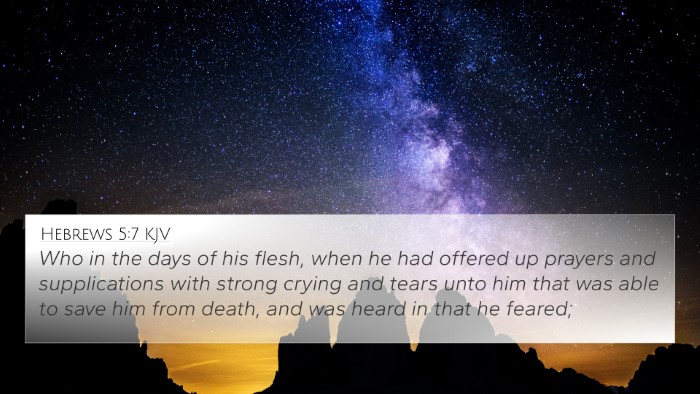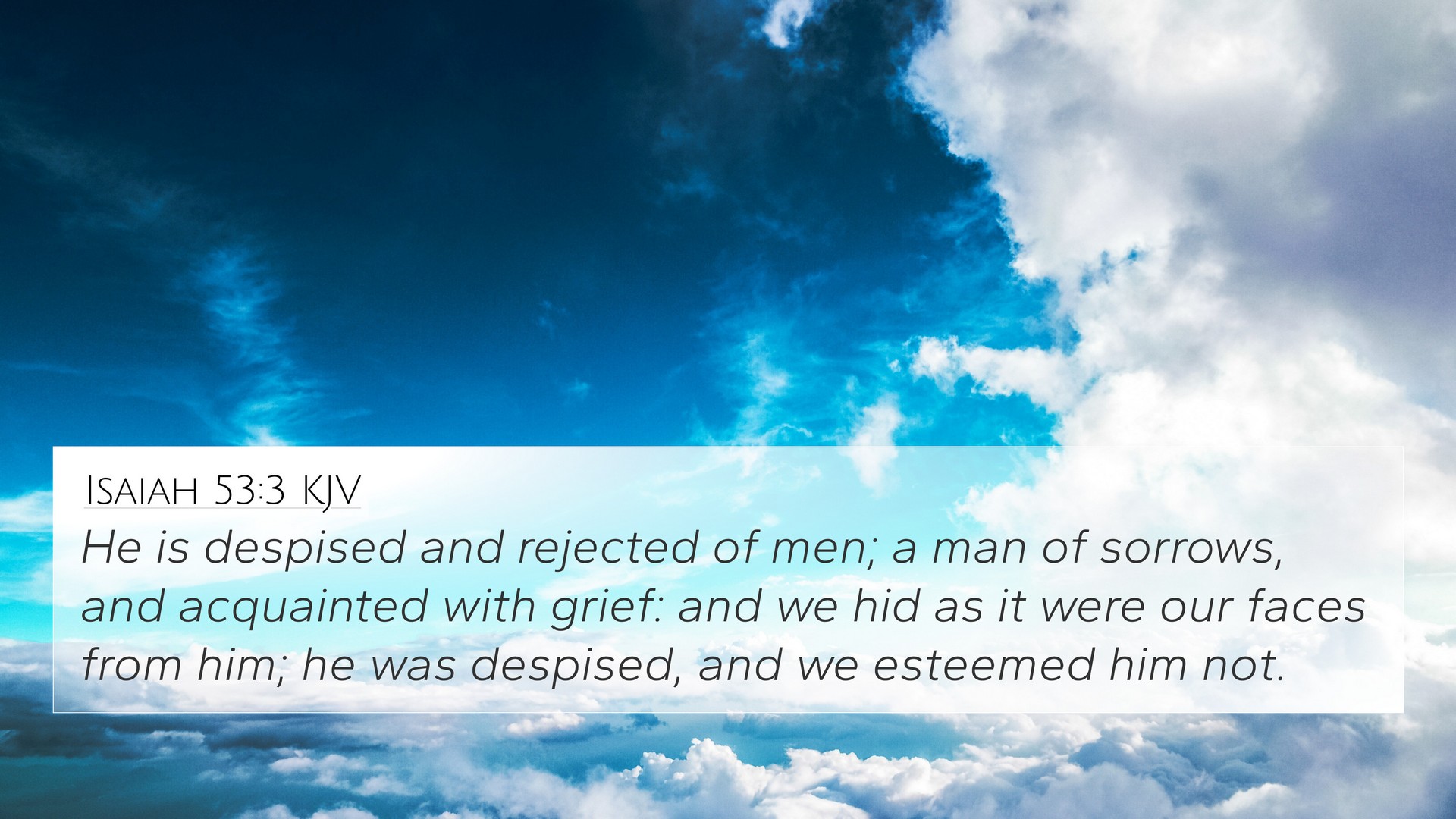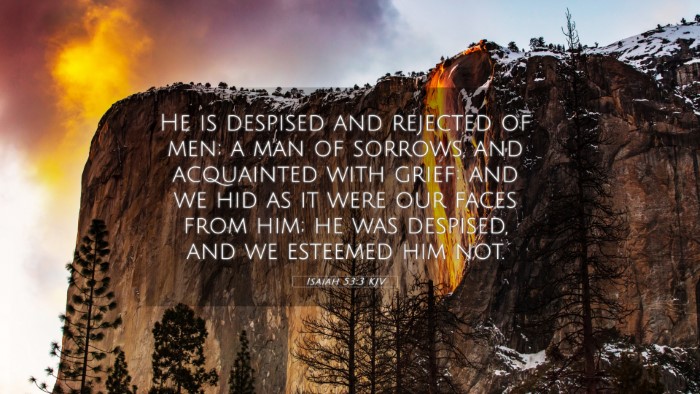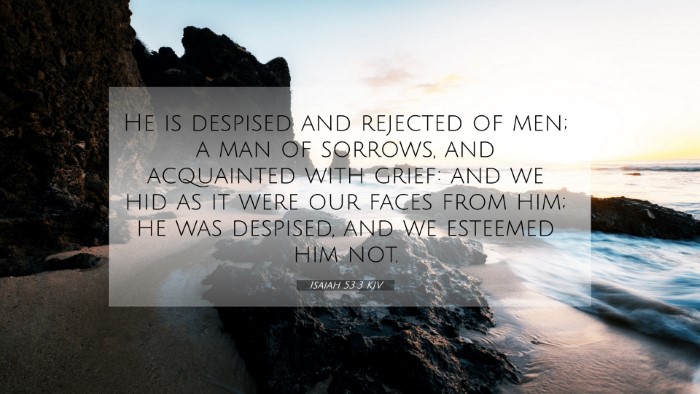This section features a detailed cross-reference designed to enrich your understanding of the Scriptures.
Below, you will find carefully selected verses that echo the themes and teachings related to Isaiah 53:3 KJV. Click on any image to explore detailed analyses of related Bible verses and uncover deeper theological insights.
 John 1:10 (KJV) »
John 1:10 (KJV) »
He was in the world, and the world was made by him, and the world knew him not.
 Matthew 26:67 (KJV) »
Matthew 26:67 (KJV) »
Then did they spit in his face, and buffeted him; and others smote him with the palms of their hands,
 Isaiah 53:10 (KJV) »
Isaiah 53:10 (KJV) »
Yet it pleased the LORD to bruise him; he hath put him to grief: when thou shalt make his soul an offering for sin, he shall see his seed, he shall prolong his days, and the pleasure of the LORD shall prosper in his hand.
 Hebrews 12:2 (KJV) »
Hebrews 12:2 (KJV) »
Looking unto Jesus the author and finisher of our faith; who for the joy that was set before him endured the cross, despising the shame, and is set down at the right hand of the throne of God.
 Isaiah 49:7 (KJV) »
Isaiah 49:7 (KJV) »
Thus saith the LORD, the Redeemer of Israel, and his Holy One, to him whom man despiseth, to him whom the nation abhorreth, to a servant of rulers, Kings shall see and arise, princes also shall worship, because of the LORD that is faithful, and the Holy One of Israel, and he shall choose thee.
 Mark 14:34 (KJV) »
Mark 14:34 (KJV) »
And saith unto them, My soul is exceeding sorrowful unto death: tarry ye here, and watch.
 Isaiah 53:4 (KJV) »
Isaiah 53:4 (KJV) »
Surely he hath borne our griefs, and carried our sorrows: yet we did esteem him stricken, smitten of God, and afflicted.
 Psalms 22:6 (KJV) »
Psalms 22:6 (KJV) »
But I am a worm, and no man; a reproach of men, and despised of the people.
 Hebrews 5:7 (KJV) »
Hebrews 5:7 (KJV) »
Who in the days of his flesh, when he had offered up prayers and supplications with strong crying and tears unto him that was able to save him from death, and was heard in that he feared;
 Isaiah 50:6 (KJV) »
Isaiah 50:6 (KJV) »
I gave my back to the smiters, and my cheeks to them that plucked off the hair: I hid not my face from shame and spitting.
 Zechariah 11:12 (KJV) »
Zechariah 11:12 (KJV) »
And I said unto them, If ye think good, give me my price; and if not, forbear. So they weighed for my price thirty pieces of silver.
 Hebrews 4:15 (KJV) »
Hebrews 4:15 (KJV) »
For we have not an high priest which cannot be touched with the feeling of our infirmities; but was in all points tempted like as we are, yet without sin.
 Luke 9:22 (KJV) »
Luke 9:22 (KJV) »
Saying, The Son of man must suffer many things, and be rejected of the elders and chief priests and scribes, and be slain, and be raised the third day.
 Mark 15:19 (KJV) »
Mark 15:19 (KJV) »
And they smote him on the head with a reed, and did spit upon him, and bowing their knees worshipped him.
 Mark 9:12 (KJV) »
Mark 9:12 (KJV) »
And he answered and told them, Elias verily cometh first, and restoreth all things; and how it is written of the Son of man, that he must suffer many things, and be set at nought.
 Luke 18:31 (KJV) »
Luke 18:31 (KJV) »
Then he took unto him the twelve, and said unto them, Behold, we go up to Jerusalem, and all things that are written by the prophets concerning the Son of man shall be accomplished.
 Hebrews 2:15 (KJV) »
Hebrews 2:15 (KJV) »
And deliver them who through fear of death were all their lifetime subject to bondage.
 Luke 16:14 (KJV) »
Luke 16:14 (KJV) »
And the Pharisees also, who were covetous, heard all these things: and they derided him.
 John 8:48 (KJV) »
John 8:48 (KJV) »
Then answered the Jews, and said unto him, Say we not well that thou art a Samaritan, and hast a devil?
 Micah 5:1 (KJV) »
Micah 5:1 (KJV) »
Now gather thyself in troops, O daughter of troops: he hath laid siege against us: they shall smite the judge of Israel with a rod upon the cheek.
 Psalms 69:19 (KJV) »
Psalms 69:19 (KJV) »
Thou hast known my reproach, and my shame, and my dishonour: mine adversaries are all before thee.
 Matthew 27:63 (KJV) »
Matthew 27:63 (KJV) »
Saying, Sir, we remember that that deceiver said, while he was yet alive, After three days I will rise again.


























